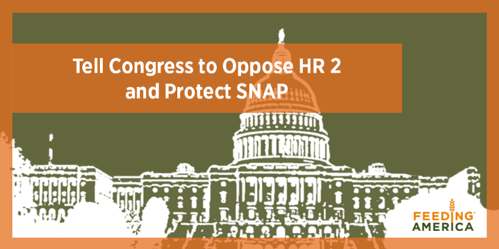Let's rally for a Farm Bill that fights hunger, not one like H.R. 2, which would increase it!
| Comments
Wisconsinites are tough and hard working. It’s in our character. Every day, we get up and get ourselves to work, get our kids to school, and take care of our friends, family and community. For many of us, we are fortunate to have enough money to get the food and nutrition we need to fuel us through the day. However, this isn’t true for nearly 700,000 of our friends and neighbors, who are working hard to make their ends meet but just come up a bit short. The Supplemental Nutrition Assistance Program (SNAP, also known as FoodShare in Wisconsin) works in concert with local food banks and pantries to help many Wisconsin families close this gap.
As many of you know, the Farm Bill is the legislative vehicle that authorizes and funds SNAP. It is up for renewal this year and unfortunately, the House of Representatives is currently considering the passage of a Farm Bill (H.R. 2) that would indiscriminately cut SNAP benefits and make it harder for seniors, children and working families to get the food they need to work, learn and live healthy lives. These cuts would widen the gap that low-income Wisconsin families experience every month.
SNAP is an important program that helps people living in households with an annual net income at or below $20,400 with a modest monthly benefit to buy groceries. In Wisconsin, the program helps over 325,000 families, including almost 300,000 children, and the average monthly benefit is about $120 per person per month. Over two-thirds of SNAP recipients in Wisconsin are children and the elderly, blind and disabled, and of the remaining third, a majority of those adults are working, they just don’t have enough hours or make enough money.
Despite the heated political rhetoric about the program, SNAP works at accomplishing its core mission: provide nutrition assistance to low-income Americans. It is highly efficient and has a low rate of program fraud.
Yet, we believe that there are many opportunities to improve SNAP and applaud that H.R. 2 makes some of these reforms, such expanded income deductions and exclusions, which help to modestly improve the benefit calculation.
However, these incremental improvements do not make up for the deep, structural program changes that are being proposed that would radically alter the way the program is operated, take away state flexibility to tailor the program to suit local needs, and cut nutrition benefits to hard working families who are just on the edge of making it out of poverty.
For example, right now, low-income Americans that qualify and receive benefits from a means-tested program can be “categorically eligible” for SNAP. One of the best examples of this is that children living in families that receive SNAP are also eligible for free or reduced-price school lunch. Because the child is living in a household that is qualified for SNAP, and therefore low-income, schools can seamlessly ensure that these kids have access to school meals.
This kind of program coordination reduces duplicative program administrative costs and unnecessary red-tape, and is an example of how government programs should work.
Unfortunately, H.R. 2 would roll back categorical eligibility and in Wisconsin, that would mean that over 75,000 Wisconsinites would lose SNAP eligibility, including almost 25,000 children, who would also lose their eligibility for school meals.
In sum, H.R. 2 would cut over $17 billion in benefits from working families, seniors, and children and divert nearly $7 billion of those cut benefit dollars into a creating a large government bureaucracy to monitor and enforce compliance with an expanded work requirement.
While we agree that a good job is best anti-hunger tool, it’s important to remember that SNAP is a nutrition program, not a jobs program. Effective work and training programs cost on average $7,500 per participant. H.R. 2 would provide only $30 per participant.
With the improving economy, SNAP participation is already on the decline. Congress should not pass a Farm Bill like H.R. 2, which cuts benefits, increases government bureaucracy and breaks the promise that we have made as Americans to provide a basic amount of nutrition assistance to people experiencing a temporary tough time.
The House of Representatives will likely be voting this week on H.R. 2. Please take a moment to email and call your Representative to let them know that the Farm Bill should fight hunger and reduce food insecurity by strengthening SNAP, not the other way around.
